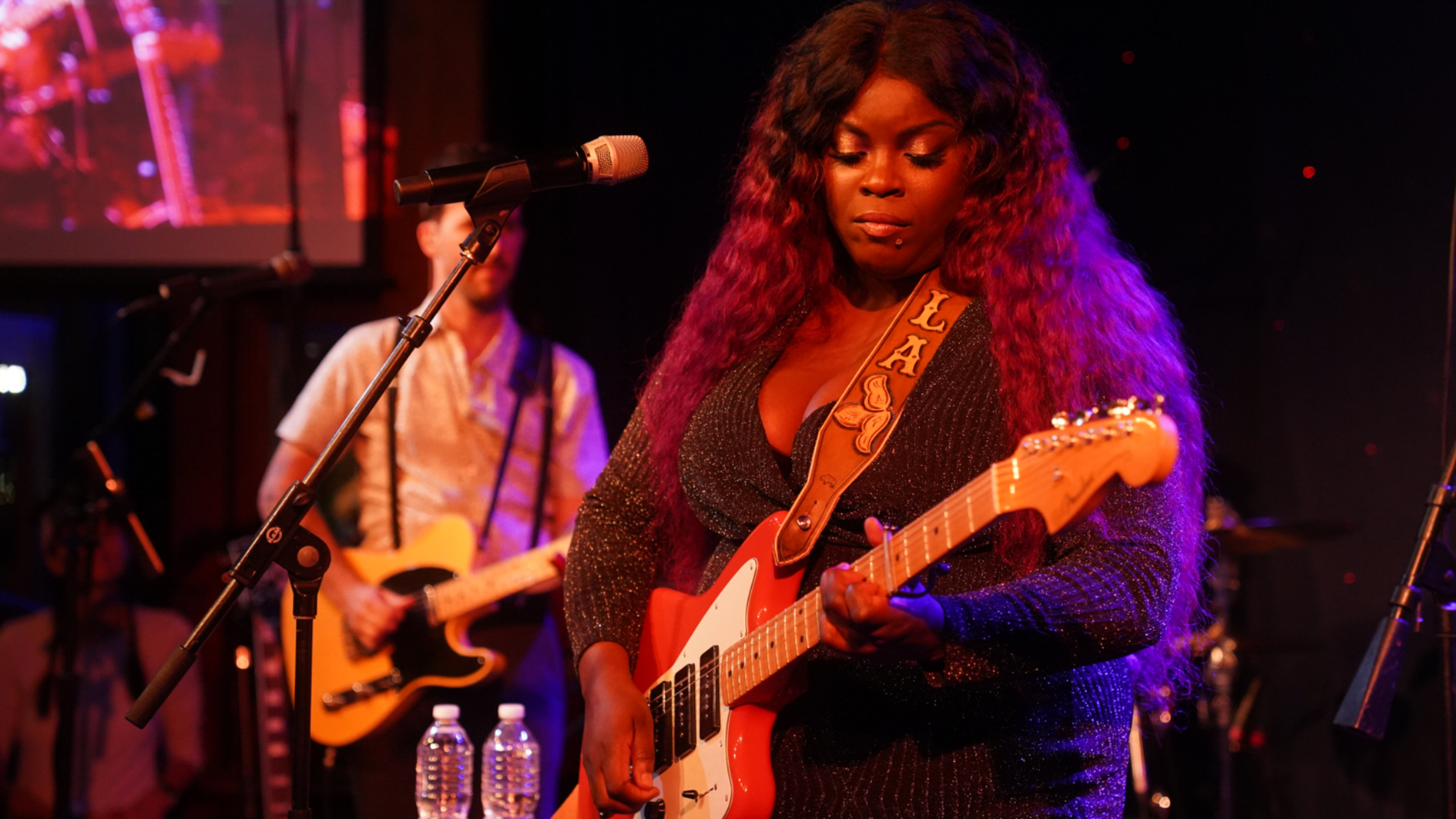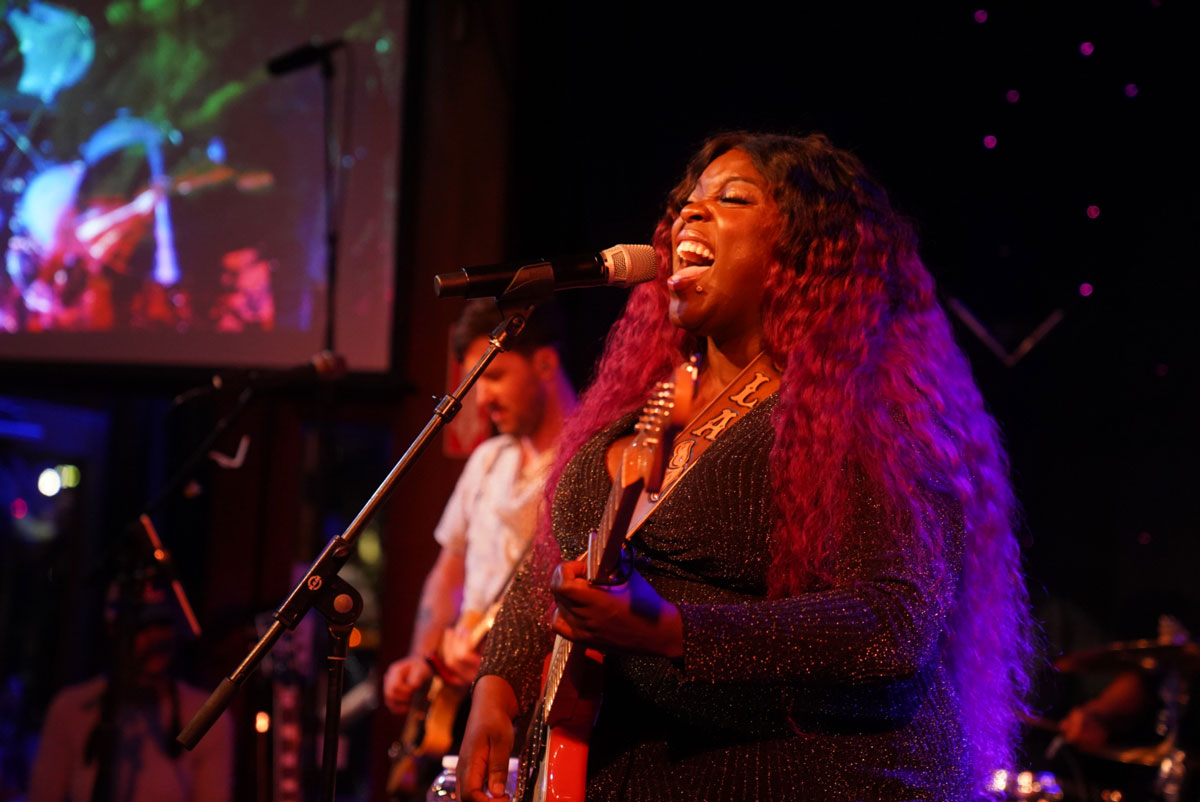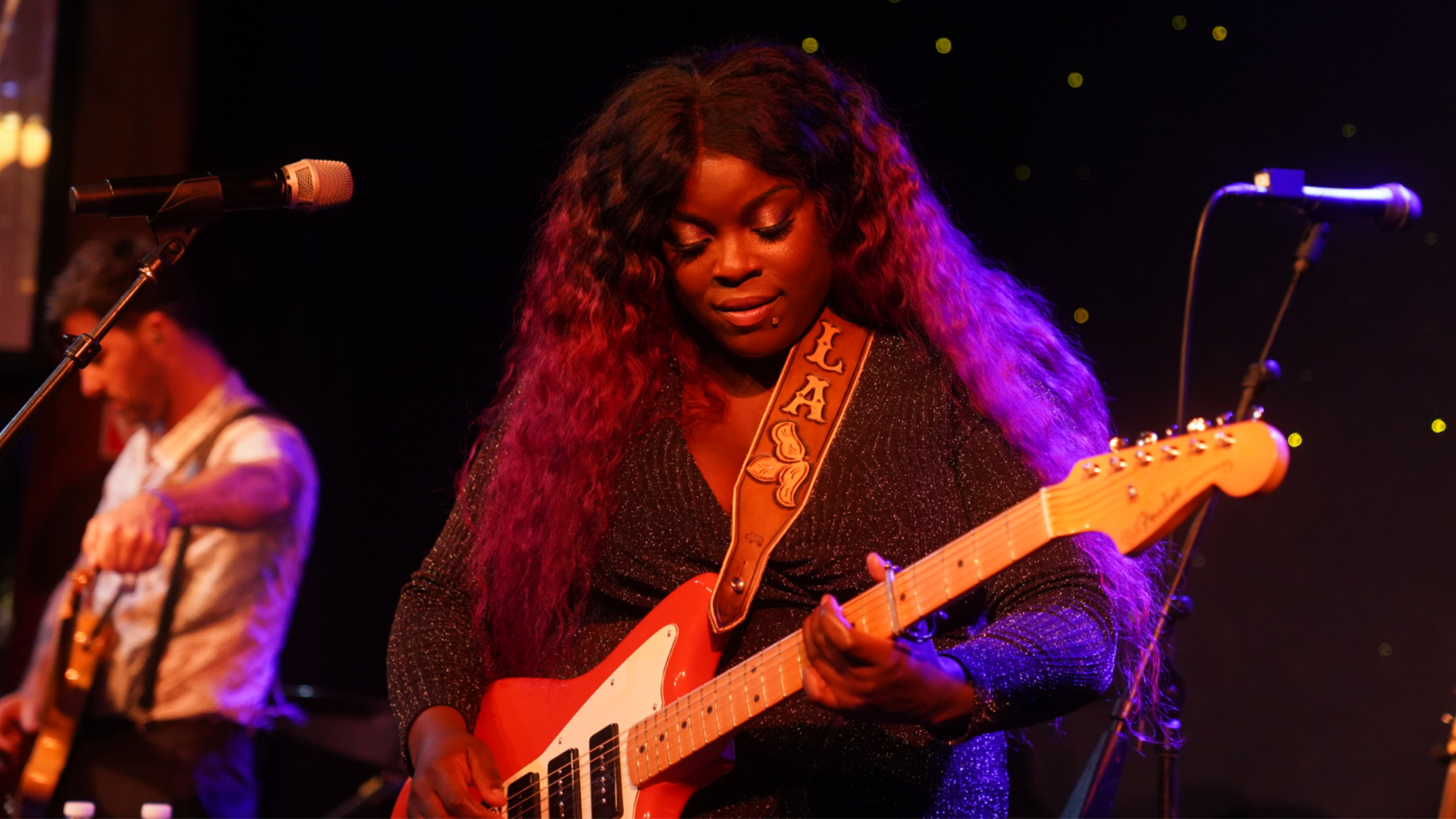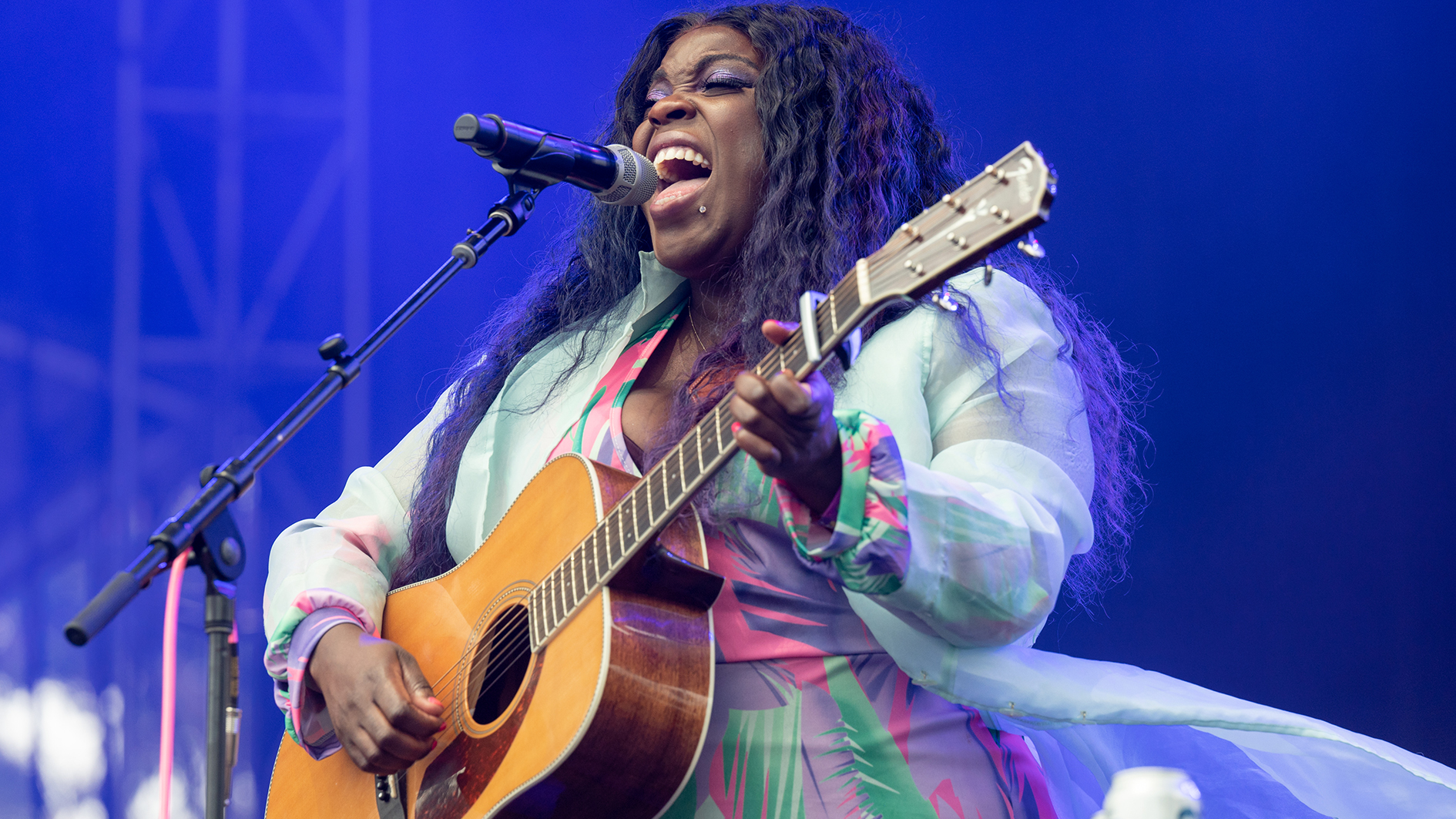Yola: “It's unfortunate that patriarchy plays a big role in the story of guitar playing. But the guitar, to me, means freedom”
The four-time Grammy-nominated guitarist and singer-songwriter on her duty to claim the guitar, playing Sister Rosetta Tharpe in Baz Luhrmann's Elvis biopic, and tracking down fuzz tones with Dan Auerbach for her sophomore album, Stand For Myself

“It’s been a long journey and a late start, but I feel as though my journey towards guitar had been guided by Sister Rosetta Tharpe from much earlier on,” explains British-born, Nashville-based singer-songwriter Yola, halfway through a conversation with Guitar World on her career to date. “And now I’ve been cast to play her in the Baz Luhrmann Elvis movie…”
Before her triple Grammy-nominated solo debut, titled Walk Through Fire and released in 2019, Yola – who also landed a Grammy nod for Best New Artist in 2020 –had lent her rich soulful vocal to projects like Massive Attack, Bugz In The Attic and Sub Focus. This year’s second album, Stand For Myself, sees her once again working with producer/co-writer Dan Auerbach (The Black Keys) – the partnership yielding some truly magnificent results.
There are big plans for 2022, as well, with the release of the Elvis biopic that also features Hollywood superstar Tom Hanks as Colonel Tom Parker and Texan blues giant Gary Clark Jr. as Arthur ‘Big Boy’ Crudup. Given her deep admiration for the Godmother Of Rock And Roll, it’s an opportunity Yola has been throwing herself into…
“I’ve been learning all her parts and through that learning to solo, which I’ve never done before!” says Yola, with a nervous laugh. “I was terrified! I was playing rhythm with some level of confidence and then suddenly thrown into the next level, soloing like one of the greatest guitar players of all time… who also sings all over her solos. You have to completely divide your brain!
“And I figured I was scared of the last thing, so let’s do it. That’s part of the reason why I took the role. Gibson very kindly sent me a replica of her Les Paul Custom, that looks like an SG but is pre-SG, and I started learning how to solo on that thing. It feels really natural to move on and really helped me get those skills down.”
It’s incredible just how much Sister Rosetta Tharpe pioneered – she was well ahead of her time.
“She was pre-everything and the genesis of all music we now hold dear. She discovered Little Richard. Then there are people like Prince, who was so influenced by Little Richard. So without her, you wouldn’t have Prince. Little Richard was wearing a whole load of makeup, ripping his clothes off and shredding in the way he learned from Sister Rosetta, but piano-style.
Get The Pick Newsletter
All the latest guitar news, interviews, lessons, reviews, deals and more, direct to your inbox!
“It was done in a very provocative way, he was very of her. But do you think a buttoned-up executive in the south of America would have thought, ‘Yes, this guy!’ Given what we know about the conservative nature of that area in that time… no way.”
What both of them managed to accomplish in the careers, especially when you factor in the odds against them, is truly mesmerizing.
I didn’t see myself as a guitar player. I was programmed into seeing instrument playing as a male exploit
“After Little Richard had been discovered and started doing amazing things, they saw the talent because they could see the money in the fame that’s already happening. Before then, hell no! Sister Rosetta was a queer Black woman in the south. She was perfectly placed to discover someone like Little Richard.
“It’s a great explanation as to why rock and roll in the '60s and '70s had such a queerness about it, even from straight men! There was something so camp about it all. Where did that come from? Its roots are as Black and queer as heck.”
Your new album is very summery and uplifting in feel, even when what you’re singing about might not be…
“Yeah, I wanted it to have that kind of energy. Even in the context of some of the things that I’m saying, my pessimism is hopeful. Or my realism is hopeful, so I’m rooted in realism but not without hope! I wanted that to come across so that the listener can live in both worlds, being uplifted by something but also slapped quite squarely in the face by it, too.”
Which was the hardest track to put together, in that regard?
“I think the truths I unveiled were ones I was ready to do. I was not in a space of discomfort necessarily, if anything some of these truths were overdue rather than ones I was stretching for. Break The Bough is about the death of my mother. That’s probably the most difficult relationship I’ve had in my life, and the most difficult thing for me to be able to talk and sing about. But it was definitely due, given that she died in 2013.
“There was enough distance from the funeral, which is when I started writing. I was riding my motorcycle back to my house from the funeral and the bassline came into my head. It felt incongruous because it’s such a party bassline [laughs]. I was wondering why the hell there was that massive party bassline in my head as I was crying on my motorcycle, trying not to crash.
The will to be the master of my own destiny was the motivation for picking up the guitar
“But it was there so I went along with it. Then the lyrics started coming as I was getting close to my house. So I sat on my bike idling, writing these words out. I was wondering why this nursery rhyme was coming out – the whole ‘Rock a-bye, baby, on the tree top’ thing. How terrifying and morbid is that?”
It must have been a very emotional time for you…
“For that first line I was visualizing my mum’s casket going down and it reminded me of the children’s song. When I sing of ‘mangoes on the tree, sugar cane and shoeless feet’ it’s all the idyllic things to any Bajan of her generation, who had been hoodwinked out of living in paradise to come and live in some backwater in rainy old England.
“They didn’t show the rainy parts in the video, obviously. It was just the sunny days to say, ‘It’s just like Barbados, of course, come over to Weston-Super-Mare!’ It was a one-way ticket.
“So there’s sadness in there, in that I’m saying ‘Get on back from whence you came’ and that was my way of saying, ‘You sucked at this whole life thing, you kinda hated it but it’s fine… you got ill which also sucked.’ Motor neurone disease is a horrible way to die.
“There was nothing but cruelty in her life so maybe her death was a great relief, if nothing else. I’m also thinking about how people say [racist] things like, ‘Go back to where you came from!’ but in this case that would have been great, because it was bloody Barbados!”

Do you remember the exact moment you decided to pick up the guitar?
“This ties in quite neatly, in fact, because it was the death of my mother that made me realize I needed autonomy. I needed to be able to be my own person and stand for myself. I started this record with Break The Bough.
“A moment of realizing that my mother had lived and tried to be part of something that was doing her wrong every which way it could do her wrong. She was living for it and it did her no favors at all. The will to be the master of my own destiny was the motivation for picking up the guitar.
I realized from playing country songs that the whole three chords and the truth paradigm meant I could get through a lot of songs without knowing a lot of chords!
“It was something that I felt I was being called to, more than piano or other instruments. And it was portable. It embodied freedom. From my knowledge of Sister Rosetta Tharpe back in my late teens and early 20s, I knew there was a great lineage that was being obscured from everybody for the sake of appropriating yet another thing that black women were at the forefront of. I felt a sort of duty to claim the guitar.”
You mainly seem to play Fender acoustics these days, but what did you start out on?
“At the time I was playing a brand-new Martin, just a cheap £350 one with a 000-sized body. That was my workhorse for a little while. By and large what I did was just learning a few chords. I realized from playing country songs that the whole three chords and the truth paradigm meant I could get through a lot of songs without knowing a lot of chords! That became a real in-point for me.
“My mum was obsessed with country, as she was disco, so I had some early exposure to Dolly Parton and artists like that. Then I was in a house fire, which only gave me superficial burns but I was wrapped like a mummy for a while. When the bandages came off, I decided to take my guitar playing more seriously…”

What kind of aspects did you choose to focus on?
“I worked on getting my strum right, learning more chords and getting used to playing confidently. For a lot of that time I was still utterly terrified. I’d essentially been told I didn’t have the inclination to play guitar so I shouldn’t bother by previous collaborators who were desperate to make sure I didn’t have all of the intellectual property – even though I kinda already did as a topliner writing lyrics and melody.
“They managed to convince me that playing C, D and G was really challenging and I shouldn’t try it. I now realize how much of a mindfuck that was, trying to keep me dependent. I never thought I’d be having this conversation with Guitar World.
“I didn’t see myself as a guitar player. I was programmed into seeing instrument playing as a male exploit. It seems unfortunate that patriarchy plays a big role in the story of guitar playing and instrument playing. But the guitar, to me, means freedom.”
Dan Auerbach guards his settings and decisions as closely as he can. If he wants to tell, he will
What’s your main rig looking like right now?
“Right now I’m playing this gorgeous Fender [Noventa] Jazzmaster with three P-90 pickups. I play that through this JHS Chorus pedal, but not in chorus mode – I use another setting that has its own sound [Vibe].
“I have an arrangement with this guitar – I’ve started playing it for the majority of the set. Fender also kindly made me a Custom Shop American Classic Telecaster, with some pickups of my choice put in, but it hasn’t arrived yet. These will be my main babies going forward, because this album rocks harder.”
The closing title track has some pretty dazzling fuzz tones. We’re guessing Dan Auerbach’s pedal collection might have come in handy there!
“The main co-writer on that song is a British woman called Hannah Vasanth. She has a studio in Hackney, where it was first written. I was in Bugz In The Attic with her. We toured for years, I’d stay at her house. Then she went to play with Rihanna [laughs].
“It was inspired by a song by Rotary Connection called I Am The Black Gold Of The Sun – and that particular version rather than the one by Nuyorican Soul. It has a fuzz guitar that’s an absolute beast sound, just absolutely gorgeous. This idea was in my head and the lyrics started coming down in the studio. Interestingly, this song started out on keys, not acoustic...”

That’s surprising! At what point did the electric guitars come in?
“We did this programmed demo with beats and that’s what I played to Dan Auerbach and Natalie Hemby, who were the other two co-songwriters. They felt it was epic and wanted to find a way of not screwing it up. We were careful to keep the energy me and Hannah put into it, but also give it more form. When we got to the studio, we did that – they added in a bridge and gave it a more traditional structure so it functioned as we wanted it to.
“We started tracking and wondering what the hell to do. So I played that Rotary Connection song, and nobody had heard it before because it’s pretty out there. We wanted to take the spirit of that song, without taking the song itself. It started sounding more rock rather than jazz or soul. It hit harder.
“That fuzz tone was right in Dan’s wheelhouse. He actually said, ‘I’ve got just the fuzz!’ and I said, ‘Of course you do, buddy!’ Fuzz is totally his thing and I knew he’d be able to find it in three seconds.”
And which one did he pick?
“No idea. And even if I did, I couldn’t tell you under pain of death. Dan guards his settings and decisions as closely as he can. If he wants to tell, he will. But he probably won’t… because he’s just not that guy. [laughs]”
- Yola's new album Stand For Myself is out now via Easy Eye Sound.
Amit has been writing for titles like Total Guitar, MusicRadar and Guitar World for over a decade and counts Richie Kotzen, Guthrie Govan and Jeff Beck among his primary influences as a guitar player. He's worked for magazines like Kerrang!, Metal Hammer, Classic Rock, Prog, Record Collector, Planet Rock, Rhythm and Bass Player, as well as newspapers like Metro and The Independent, interviewing everyone from Ozzy Osbourne and Lemmy to Slash and Jimmy Page, and once even traded solos with a member of Slayer on a track released internationally. As a session guitarist, he's played alongside members of Judas Priest and Uriah Heep in London ensemble Metalworks, as well as handled lead guitars for legends like Glen Matlock (Sex Pistols, The Faces) and Stu Hamm (Steve Vai, Joe Satriani, G3).
“I was writing songs from eight years old, but once I got a guitar I began to deeply identify with music… building an arsenal of influences”: How Lea Thomas uses guitars her dad built to conjure a magic synthesis of folk, pop and the ethereal
“I liked that they were the underdogs. It was not the mainstream guitar. It was something that was hard to find”: Vox guitars deserve a second look – just ask L.A. Witch’s Sade Sanchez, who’s teaming hers with ugly pedals for nouveau garage rock thrills











